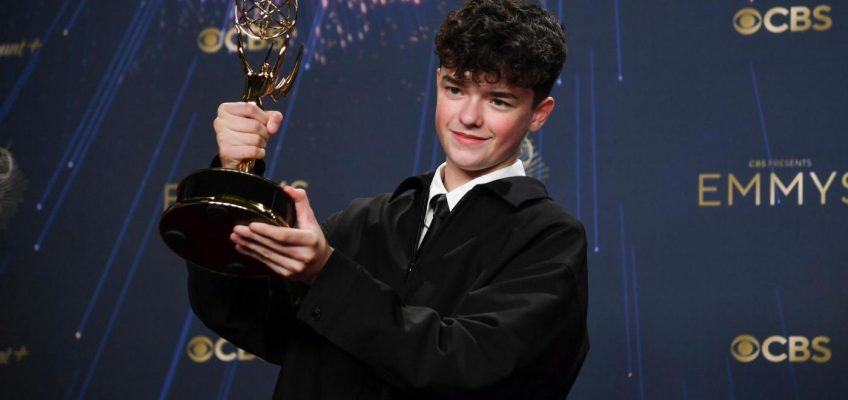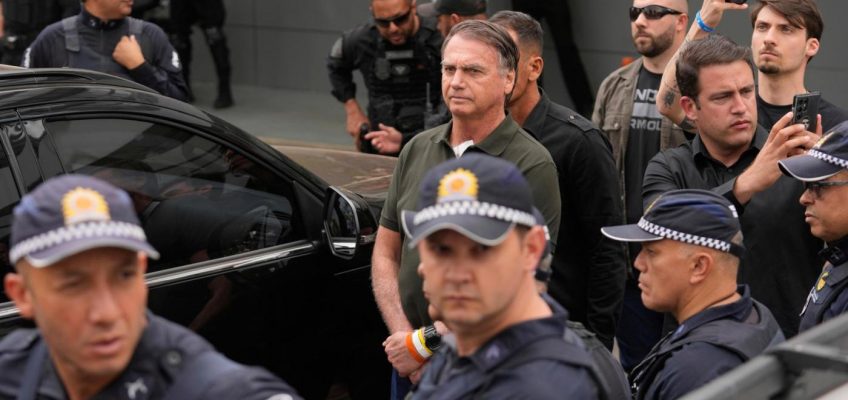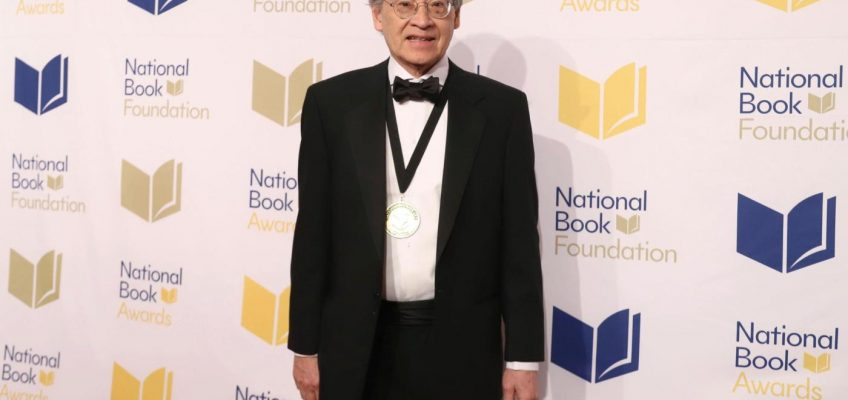By MARK KENNEDY
The Emmy Awards weren’t all about Seth Rogen walking up the aisle in his burnt brown tux to collect yet another award. It just sometimes seemed that way.
Rogen’s “The Studio” won a total of 13 Emmys, breaking the all-time record for most wins for a comedy series. Rogen himself won four, tying the record for most Emmys won by a single individual in one night.
“I’m legitimately embarrassed,” Rogen admitted at one point.
But behind the undeniable march of “The Studio” were some other pieces of Emmy history. The youngest male actor ever was crowned for the series “Adolescence” and “Severance” star Tramell Tillman became the first Black actor to win in his category. And the up and down year of Stephen Colbert hit a high.
An adolescent makes history
Owen Cooper, 15, shattered the Emmy record for youngest male acting winner.
The “Adolescence” star won best supporting actor in a limited or anthology series. The Netflix four-part series which traces the emotional fallout after a U.K. teenage stabbing, became a sensation, a sort of 2025 version of last year’s “Baby Reindeer.”
In his acceptance speech, Cooper revealed he only started acting classes a few years ago and encouraged those watching to step out of their comfort zones.
“A couple years back I didn’t expect to be in the United States, let alone here. Tonight proves if you listen, you focus and you step out of your comfort zone, you can achieve anything in life. I was nothing three years ago. I’m here now,” he said.
The record for youngest male actor had previously been held by Scott Jacoby, who was 16 when he won in the supporting drama actor trophy for “That Certain Summer” in 1973. The youngest Emmy winner ever is Roxana Zal, who won a Primetime Emmy for outstanding supporting actress in a limited series in 1984 at age 14.
Cooper beat Javier Bardem, Bill Camp, Rob Delaney, Peter Sarsgaard and his “Adolescence” co-star Ashley Walters.
Stephen Colbert going out with a bang
“The Late Show With Stephen Colbert” won the award for best talk series for the first time, just months after learning it was being canceled.
Stephen Colbert presents the award for outstanding lead actor in a comedy series during the 77th Primetime Emmy Awards on Sunday, Sept. 14, 2025, at the Peacock Theater in Los Angeles. (AP Photo/Chris Pizzello)
In July, CBS announced it was ending the show, attributing the cause to financial reasons. The series will go off the air in May 2026.
Colbert, who has hosted his show since 2015, was gracious, thanking CBS for his shot and quoting from Prince’s hit “Let’s Go Crazy”: “If the elevator tries to bring you down/Go crazy, punch a higher floor.”
Earlier in the night, he turned his time as award presenter into a job ad, getting a standing ovation as he approached the microphone to announce the winner of lead actor in a comedy series.
“While I have your attention, is anyone hiring? Because I’ve got 200 very well-qualified candidates with me here tonight. We’ll be available in June,” he said.
He then pulled out a resume and an old headshot but realized he only had the one copy. “Harrison Ford, could you get this to Spielberg?” He ran over to Ford, who seemed to promise he would.
Tramell Tillman charms
Tramell Tillman made history, but he made it all about his mom.
Tramell Tillman accepts the award for outstanding supporting actor in a drama series for “Severance” during the 77th Primetime Emmy Awards on Sunday, Sept. 14, 2025, at the Peacock Theater in Los Angeles. (AP Photo/Chris Pizzello)
The “Severance” star became the first Black actor to win best supporting actor in a drama playing the creepy, unnerving Seth Milchick.
Tillman thanked his first acting coach — his mother, who was also his date.
“You remember what you want to remember. You make time for what you want to make for. Do the work. Show up. And most importantly, for the love of God, don’t embarrass me in public,” he said. “My first acting coach was tough, y’all, but all great mothers are.”
Tillman, holding the statuette high, added: “This is for you. I am full, I am humbled, I am honored.”
A fake ER worker honors the real ones
Noah Wyle’s narrative was just too powerful to deny. After getting five nominations without a win for “ER,” the actor came back to don scrubs 30 years later and won his first Emmy for playing another emergency doctor on “The Pitt.”
Noah Wyle accepts the award for outstanding lead actor in a drama series for “The Pitt” during the 77th Primetime Emmy Awards on Sunday, Sept. 14, 2025, at the Peacock Theater in Los Angeles. (AP Photo/Chris Pizzello)
Wyle thanked HBO Max and Warner Bros. Television for allowing “the conditions to exist for lightning to strike in my life twice.”
And then he dedicated his award to those in the health care field.
“To anybody who’s going on shift tonight or coming off shift tonight, thank you for being in that job. This is for you,” Wyle said.
A little politics
CBS is likely wiping its network forehead that a bitterly divided nation didn’t make the Emmys a divisive place.
Yes, Javier Bardem wore a kaffiyeh in support of Palestinians and Television Academy Chairman Cris Abrego criticized Congress for voting to defund the Corporation for Public Broadcasting. But Donald Trump and Charlie Kirk were never mentioned on the broadcast and even Stephen Colbert — never shy to mock the powerful — stayed apolitical.
The most explosive it got was when “Hacks” star Hannah Einbinder ended her acceptance speech win with vocal support for the Philadelphia Eagles, an expletive aimed at the U.S. Immigration and Customs Enforcement agency and a call to “free Palestine.”
Speeches that cost a lot
At the last Emmys, host Anthony Anderson turned to his mother to enforce shorter acceptance speeches. This year host Nate Bargatze used guilt.
He revealed he would pledge $100,000 to the Boys & Girls Clubs of America but that donation would shrink by $1,000 for every second a winner exceeded their 45-second speech limit.
Some winners went too long — like Einbinder, who promised to pay the difference — and some went purposely fast — like John Oliver and Rogen — to take advantage of a new rule Bargatze proposed: Every second saved from the 45-second limit would get back $1,000.
In the end, Bargatze promised to still donate not just the original amount, but — when adding CBS’ contribution — came out to be a full $350,000.
“Go to heaven a-shoutin’”
Phylicia Rashad introduced the in memoriam section, highlighting the loss of her TV son, Malcolm Jamal Warner, the “Cosby Show” star who died in July. “Like all our friends and colleagues who transitioned this past year, Malcolm Jamal Warner remains in our hearts.”
Then Lainey Wilson and Vince Gill sang a tender “Go Rest High on That Mountain” during the tribute, which included Teri Garr, Ozzy Osbourne, Chuck Woolery, Loni Anderson, Bill Moyers, George Wendt, Loretta Swit. Maggie Smith, David Lynch, Richard Chamberlain, Linda Lavin, Anne Burrell, Michelle Trachtenberg and Quincy Jones. Notable absences were Hulk Hogan and Polly Holliday.
Tributes, tributes, tributes
The Emmys looked back by celebrating the anniversary of several shows, including having Reba McEntire, Karen Fairchild and Kimberly Schlapman performing the theme song of “The Golden Girls” for its 40th anniversary.
Jeff Probst was on hand to celebrate the 50th season of “Survivor,” presenting the award for scripted variety series as if it was a tribal council meeting.
Alexis Bledel and Lauren Graham stood in a replica of their Connecticut home set to celebrate “Gilmore Girls,” a coming-of-age story, blending wittiness with relatable family dynamics that celebrated its debut 25 years ago.
Additional tributes honored “Law & Order’s” 35th anniversary, featuring Ice-T, Tony Goldwyn, Mariska Hargitay, S. Epatha Merkerson and Christopher Meloni.
“Grey’s Anatomy” — the longest-running prime-time medical drama in American television history — was supposed to mark its 20th anniversary with appearances by Eric Dane and Jesse Williams. Only Williams was there; Dane revealed his ALS diagnosis in April.
Ray Romano, left, and Brad Garrett present the award for outstanding comedy series during the 77th Primetime Emmy Awards on Sunday, Sept. 14, 2025, at the Peacock Theater in Los Angeles. (AP Photo/Chris Pizzello)
Ray Romano and Brad Garrett had a mini-reunion of “Everybody Loves Raymond.” It was one of the night’s funniest bits, with both men sad about how long it had taken them to be back at the Emmys. Garrett wondered if he’d make the in memoriam section after he died. “If it’s a slow year, no doubt,” Romano told him.
This story corrects the title of “Baby Reindeer.”
For more coverage of this year’s Emmy Awards, visit: https://apnews.com/hub/emmy-awards




